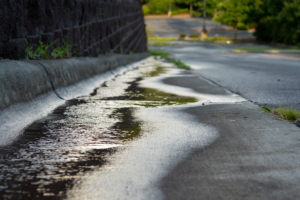Natural Gas Pipeline Construction Required to Identify and Mitigate Impacts to Water Quality
Over the course of three years, from 2013 to 2016, CLA volunteer attorneys assisted the Gunpowder Riverkeeper in challenging Columbia Gas Transmission, LLC’s proposal to extend an existing natural gas pipeline an additional 21 miles across Maryland from Baltimore County to Harford County. The pipeline would cross and potentially impact about 80 waterways, including trout habitat and drinking water sources for 1.8 million area residents in the City of Baltimore and Baltimore County. The construction project would also effect 305.4 acres of largely forested land and 5.35 acres of wetlands. State and federal permits are required because construction of the project will result in the discharge of sediments and other debris into streams and wetlands.
At the beginning of the Columbia Gas pipeline project, CLA assisted the Riverkeeper with comments before the Federal Energy Regulatory Commission (FERC) as well as meetings with the Maryland Department of the Environment (MDE) and the Army Corps of Engineers regarding public notice and stream impact issues.
Gunpowder Riverkeeper, with the help of CLA volunteer attorneys, pursued a state court challenge to MDE’s decision to issue a permit authorizing work that would impact wetlands. The Riverkeeper also challenged MDE’s decision to issue a certification under the Clean Water Act stating that the project would not adversely impact water quality. In April 2015, the Circuit Court for Baltimore County agreed with the Riverkeeper that MDE’s decision to grant a wetlands permit for the project violated state and federal law. The court ruled that “the permit sets forth general rather than specific requirements, rendering it impossible for this Court to determine whether the Permit complies with [s]tate and federal water quality regulations.” As a result, the court directed MDE to revise and reissue the permit before the construction project could continue.
In September 2015, the Riverkeeper challenged MDE’s reissued non-tidal wetlands permit for the Columbia pipeline, and the parties ultimately reached a settlement in December 2015. The reissued permit required the natural gas pipeline company to identify impacts on waterways and to mitigate these impacts during construction of the pipeline. As part of the mitigation, Columbia had to do stream sampling during construction. The largest impact to water quality, other than a spill, would occur during construction of the pipeline. A baseline water quality sample collected before construction with continued sampling during and after construction will ensure Columbia has taken appropriate mitigation steps. CLA volunteer attorneys assisted Gunpowder Riverkeeper enforce the terms of the settlement, and Columbia agreed to conduct sampling of certain streams prior to commencing construction.
Many CLA volunteer attorneys donated their time to support Gunpowder Riverkeeper with this fight to protect water quality and habitat from natural gas pipeline construction, including: Julia Crowley, Greta Swanson, William A. Anderson II, Paul Smail, Ross Phillips, Jon DeCarlo, Richard Goldring, William Davies, Sarah Purpura, Daniel Sotelino, and CLA Interns. Many thanks to these attorneys for volunteering their time to protect the Gunpowder River.


